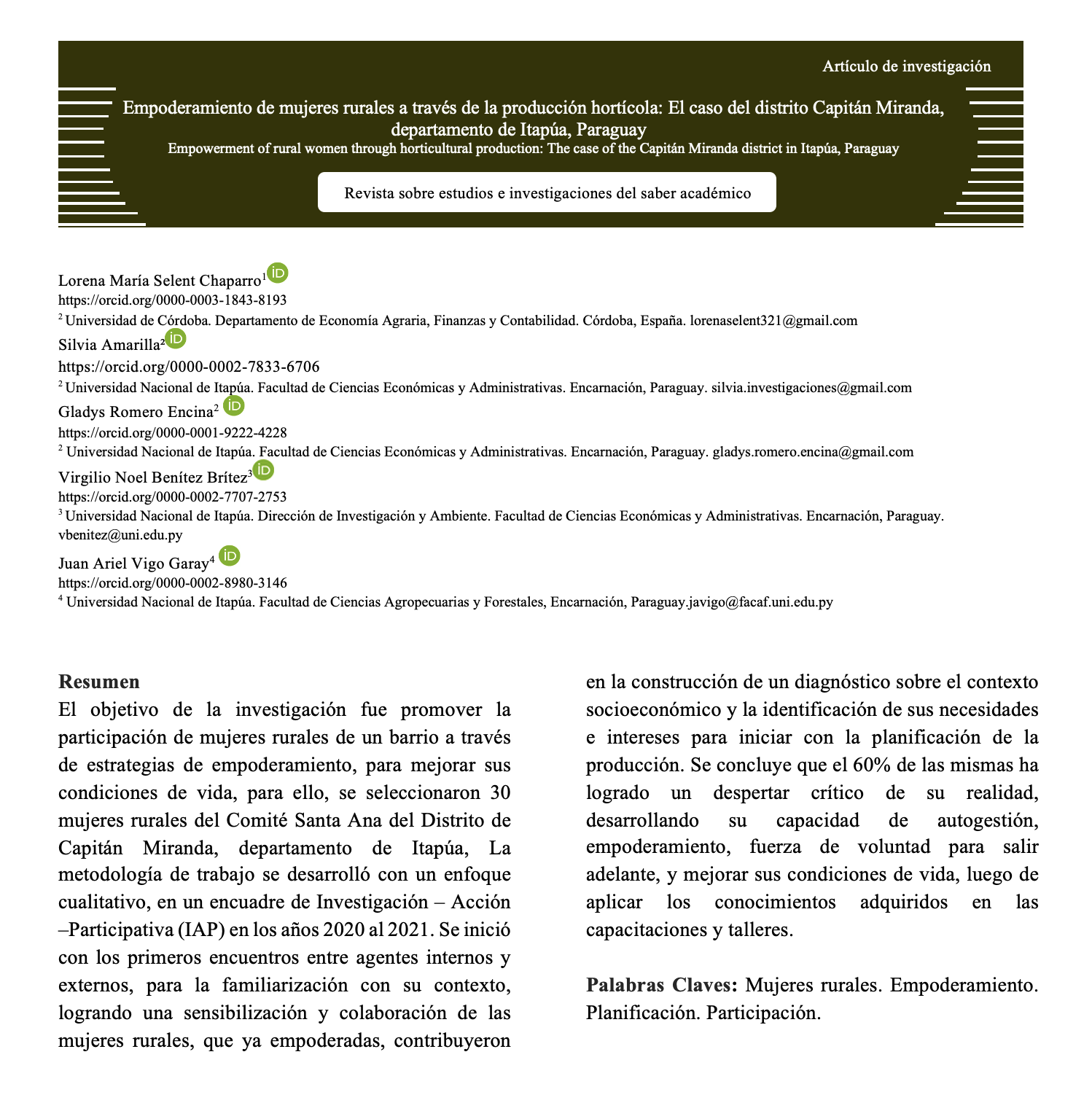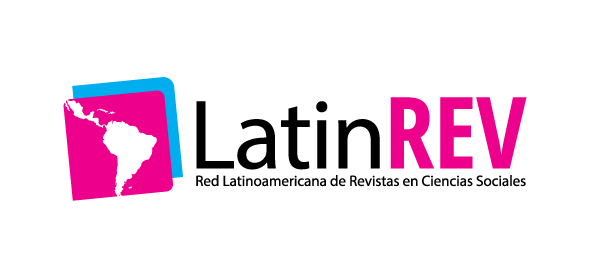Empowerment of rural women through horticultural production: The case of the Capitán Miranda district in Itapúa, Paraguay
The case of the Capitán Miranda district in Itapúa, Paraguay
DOI:
https://doi.org/10.70833/rseisa17item307Keywords:
Rural women, Empowerment, Planning, ParticipationAbstract
The objective of the study was to promote the participation of rural women in a neighborhood through empowerment strategies, to improve their living conditions, for this purpose, 30 rural women were selected from the Santa Ana Committee of the District of Capitán Miranda, department of Itapúa, the study methodology was developed with a qualitative approach, in a framework of Research - Action - Participatory (RAP) in the years 2020 to 2021. It began with the first meetings between internal and external agents, to familiarize them with their context, achieving awareness and collaboration of rural women, who, already empowered, contributed to the construction of a diagnosis of the socioeconomic context and the identification of their needs and interests to start with the production planning. It is concluded that 60% of them have achieved a critical awakening of their reality, developing their capacity for self-management, empowerment, willpower to move forward and improve their living conditions, after applying the knowledge acquired in the training and workshops.
Downloads
References
Chiappe, M. (2014). Las mujeres rurales en la agricultura familiar de la región sur de América Latina. Re-significando la familia en América Latina: entre imágenes y realidades. Concepción: Universidad del Bio-Bio, 237-83.
Fawaz-Yissi, M. J., & Rodríguez-Garcés, C. (2013). Mujeres rurales y trabajo en Chile central. Actitudes, factores y significaciones. Cuadernos de Desarrollo Rural, 10(72), 47-68.
García, B., & de Oliveria, O. (2007). Trabajo extradoméstico y relaciones de género: una nueva mirada.
Guereña, A. (2017). Kuña ha yvy. Desigualdades de Género en el Acceso a la Tierra en Paraguay.
Instituto Nacional de estadísticas de Paraguay -INE. (2017). Encuesta Permanente de Hogares Continua 2017-2020. Cuarto trimestre. Recuperado https://www.ine.gov.py/microdatos/Encuesta-Permanente-de-Hogares-Continua.php
Khan, RAG, Khan, FA y Khan, MA (2011). Impacto de la capacitación y el desarrollo en el desempeño organizacional. Revista mundial de investigación empresarial y de gestión, 11 (7).
Longo, R. G. (2015). Mujeres rurales. Prácticas de exigibilidad de derechos y construcciones alternativas en escenarios territoriales rurales. un estudio de caso: sobre la experiencia de la coordinadora nacional de mujeres trabajadoras rurales e indígenas de Paraguay. In VII Congreso Internacional de Investigación y Práctica Profesional en Psicología XXII Jornadas de Investigación XI Encuentro de Investigadores en Psicología del MERCOSUR. Facultad de Psicología-Universidad de Buenos Aires.
Martí, J. (2017). La investigación-acción participativa: estructura y fases.
Municipalidad de Capitán Miranda- MCM (2016). Plan Municipal de Desarrollo Sustentable.
Organización de las Naciones Unidas para la Alimentación y la Agricultura-FAO (2007). Situación de las mujeres rurales. Chile. Santiago. Recuperado de https://www.fao.org/publications/card/es/c/45c8ccc7-e5b1-51ee-b082-52a7150ea956/
González Vera, M., Zavattiero, C., Serafini Geoghegan, V., Soto, L., Argaña, M., Riquelme, Q., . . . Soto, C. (10 de junio de 2019). Usos del tiempo y desigualdades en Paraguay (Primera ed.). Asunción, Central, Paraguay: Centro de Documentación y Estudios. UNU Mujeres. Recuperado el 17 de enero de 2022, de https://www.cde.org.py/wp-content/uploads/2019/10/19-9-6-ORIGINAL-USOS-DEL-TIEMPO.pdf

Downloads
Published
How to Cite
License
Copyright (c) 2023 Lorena Maria Selent Chaparro, Silvia Amarilla, Gladys Romero Encina, Virgilio Noel Benítez Brítez, Juan Ariel Vigo Garay

This work is licensed under a Creative Commons Attribution 4.0 International License.
Creative Commons Attribution License CC-BY
You are free to:
Share — copy and redistribute the material in any medium or format.
Adapt — remix, transform, and build upon the material for any purpose, including commercially.
Under the following terms:
Attribution — You must give appropriate credit, provide a link to the license, and indicate if any changes have been made. You may do so in any reasonable way, but not in any way that suggests that you or your use is endorsed by the Licensor.






